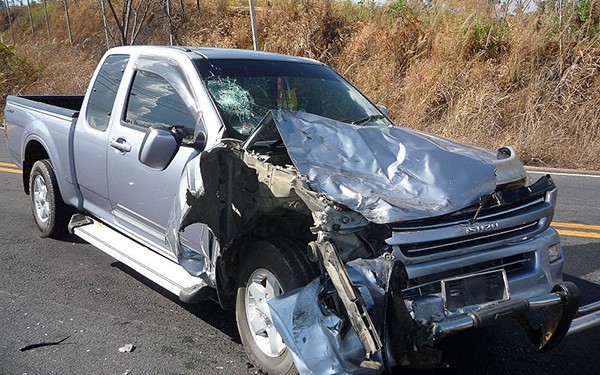The tragic story of 25 people losing their lives in a crash between a minivan and a pick up truck in Chonburi was a real hammer blow for me.
I thought of the victims; of their lives and their loves and their worries and hopes. But I also thought of their families; of parents burying children, of newly orphaned boys and girls, and of husbands and wives whose loved-ones’ lives were snuffed out in an instant with all the cruel, nihilistic meaninglessness the universe is capable of.
The Bangkok Post reported that 478 people died and 4,128 were injured on Thai roads during the ‘seven dangerous days’ from Dec 29 to Jan 4. That means 2016/17 has the dubious honour of being the largest new year death toll in the ten years since records have been kept.
It is, of course, impossible for a single human being to quantify the collective heartbreak felt when 478 lives are cut short. These were not 90 year olds who died in their bed surrounded by great-grandchildren after long, fruitful lives.
According to statistics published by the World Health Organisation, Thailand has the second deadliest roads per capita in the world after Libya. There were 36.2 deaths per 100,000 people in Thailand during 2013. Following Thailand on this list of shame are Malawi, Liberia and DR Congo.
For comparison, during this same period Germany had 4.3 deaths per 100,000 people. The United Kingdom’s roads were even safer, with 2.9. All of this is easy for me to believe. I never saw a serious car accident before I moved to Bangkok and in five years living here I’ve seen cars upside down seconds after an accident, multiple crashes and, perhaps worst of all, I saw a person’s feet twitch in the last seconds of life after a car hit their motorbike.
So why are Thailand’s roads so unsafe? Here are a few observations I’ve made over the years I’ve been living here.
There seem to be no rules on highways about when it is appropriate to overtake. Cars weave in and out between lanes at high speed. Surely the right lane should be for overtaking, but I don’t know what the actual rules say since I don’t drive here.
A seatbelt culture needs to happen, and fast. I take a minivan to work and every day I can’t help noticing I’m usually the only person who clicks their seatbelt on. It’s as if it costs extra to put one on and I don’t understand how a people so used to carnage on the roads can be so apathetic about them. While I’ve got white knuckles on a highway commute that’s like a scene from The French Connection, the girl sitting beside the driver is nodding off without a seatbelt on.
For some inexplicable reason seatbelts are purposely hidden by taxi drivers. Perhaps ten per cent of the back seats in cabs have functioning seatbelts. I would love someone to explain the logic of this to me because as far as I can tell the driver has to work hard to remove it, and all so there’s a higher chance of his passengers going through the windscreen in case of a crash.
Make motorcyclists follow the rules. Many of them drive on footpaths. They ride four or five to a bike. They drive on highways. They drive down roads in the wrong direction. They don’t wear helmets. They drive with pets and babies as passengers. Underage kids drive them to school. Women ride side-saddle on motosais, as if this is perfectly normal. Add this to the fact that nobody wears leather and it means even if they do survive a crash they’ll be disfigured for the rest of their lives. Human skin doesn’t last very long on hot asphalt at 80 km/hour.
I’m pragmatic enough to realise that developing nations can’t be perfect, but there’s nothing inevitable about these deaths. These people didn’t die because of disease or hunger. They died for reasons I can’t wrap my head around.
I doubt what I’ve written here will do anything more than give a few people some food for thought, but two things are undeniable: the suggestions I’ve made cost nothing to implement, and we can be certain that at least a few lives would be saved.
And that’s important. Just think how much better 2017 would be for one family if that death toll had stayed at 477.
Featured image is of a car crash in Phitsanulok/Phetchabun and by love krittaya (CC 1.0 public domain licence)


